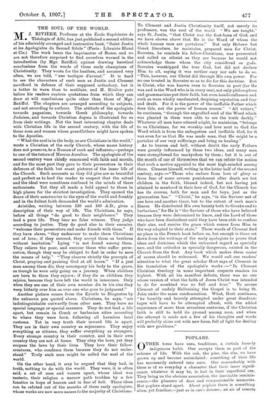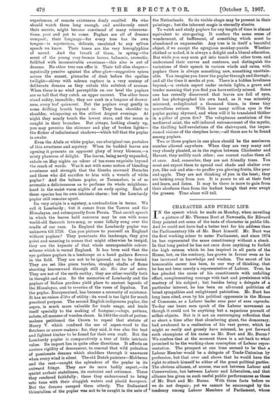POPLARS.
OTHER trees have uses, traditions, a certain homely indigenous habit. One accepts them as part of the scheme of life. With the oak, the pine, the elm, we have grown up and become assimilated : something of their life has necessarily entered into ours. Our comradeship with them is of so everyday a character that their inner signifi- cance, whatever it may be, is lost in their superficial one. They bring us the obvious association, the inevitable reminis- cence,—the pleasure of dear and companionable memories. But poplars stand apart. About poplars there is something alien, yet familiar,—just as in one's dreams; an air of remote
experiences, of remote existences dimly recalled. He who should watch them long enough, and assiduously court their secrets, might become convinced of many reincarna- tions, past and yet to come. Poplars are all of dreams compact; their language—for every tree has its own tongue—is mysterious, delicate, unrelated to any sylvan speech we know. Their tones are the very hieroglyphics of sound. And the breath of them, in spring—the scent of the young rosy-bronze leaves, balsamic, aromatic,
fulfilled with inconceivable sweetness—this also is out of dreams. No other tree can offer it. Their tall slim shapes—
mystically pensive against the after-glow—suggestive spires across the sunset, pinnacles of dusk before the opaline twilight—shiver with solemn rapture in a very ecstasy of deliberate dreams as they exhale this subtlest of aromas.
When there is no wind perceptible on our level the poplars are so tall that they catch an upper current. The other trees stand sultry, immobile ; they are sunk in a languor of drowsi- ness, every leaf quiescent. But the poplars sway gently in some drifting breath beyond us. They lean shoulder to shoulder, whispering on the stillest August evenings. At night they nearly touch the lowest stars, and the moon is caught in their branches. But always, looking closely up, you may perceive the shimmer and play of broken lights—. the flicker of infinitesimal shadows—which tell that the poplar is awake.
Even the Abele or white poplar, our aboriginal one, partakes of this sweetness and mystery. When its budded leaves are opening it presents an apparent glory of ivory blossom,—a misty phantom of delight. The leaves, being newly expanded, exhale on May nights an odour of tea-roses exquisite beyond the reach of words. Was it not with some notion of blending sweetness and strength that the Greeks crowned Heracles and those who did sacrifice to him with a wreath of white poplar? And the balsam poplar, or Tacamabac, is of so aromatic a deliciousness as to perfume its whole neighbour- hood in the moist warm nights of an early spring. Each of these species has its own intrinsic charm : but the Lombardy poplar still remains apart.
Its very origin is a mystery, a contradiction in terms. We call it Lombardy ; but it comes from the Taurus and the Himalayas, and subsequently from Persia. That occult speech in which the leaves hold converse may be one with some world-old Sanscrit love-song, or some lullaby sung over the cradle of our race. In England the Lombardy poplar was unknown till 1758. Can you picture to yourself an England without poplars ? They punctuate the landscape, they give point and meaning to scenes that might otherwise be insipid, they are the keynote of that whole unsurpassable colour- scheme which is vernal England. It has been said that the eye gathers poplars in a landscape as a. hand gathers flowers in the field. They are not to be ignored, not to be denied. They are set like green torches, straight shafts of flame shooting heavenward through still air. Sic itur ad astra. They are not of the earth earthy; they are other-worldly both in thought and aim. So the memories of Lombardy and the poplars of Italian gardens yield place to ancient legends of the Himalayas, and to reveries of the roses of Ispahan. Yet the poplar, Europeanised, has become a necessity of existence. It has no raison d'être of utility: its wood is too light for much practical purpose. The second English indigenous poplar, the aspen, is much more valuable for trade usage, and lends itself specially to the making of footgear,—clogs, pattens, sabots, all manner of wooden shoon. In 1464 the craft of patten- makers petitioned the Crown to repeal that statute of Henry V. which confined the use of aspen-wood to the fletchers or arrow-makers: for, they said, it was also the best and lightest timber to be found for their own craft. But the Lombardy poplar is comparatively a tree of little intrinsic value. Its import lies in quite other directions. It affects an austere rigidity of demeanour, to conceal that wild pulsation of passionate dreams which shudders through it unawares- when every wind is silent. The old Dutch painters—Hobbema and the rest—caught the splendour of the poplar in its outward fringe. They saw its mere bodily aspect,—its quaint archaic stateliness, its restraint and reticence. These they rendered faithfully ; these they endeavoured to bring into tune with their sluggish waters and placid bourgeois. But the dreams escaped them utterly. The Italianised Orientalism of the poplar was not to be caught in the nets of
the Netherlands. So its visible shape may be present in their paintings ; but the inherent magic is eternally elusive.
To watch and study poplars for any length of time is almost equivalent to star-gazing. It confers the same sense of wonderment, of bafflement, of something which must be abandoned as unguessable. Any tree is in itself a beautiful object, if we except the egregious monkey-puzzle. Whether clothed or naked, it is always a delight and a liberal education. But while you may soon get into touch with other trees, and understand their curves and contours, and distinguish the variations of their speech in various winds and rains, with poplars there is always something new, something unattain- able. You imagine you know the poplar through and through ; and all the time it mocks at you. There is a hidden loveliness beyond,—a certain aspect under certain lights, a grave and tender meaning that you find you have entirely missed. Some one has recently discovered that leaves are full of eyes, and has photographed his own hand, as it was minutely mirrored, reduplicated a thousand times, in these tiny marvellous retinae. With how many million eyes is the poplar gazing skyward, and when will it be translated thither in a pillar of green fire? The voluptuous asceticism of the mediaeval saint, the self-induced entrancement of the mystic, the thrilling half-revelations of the clairvoyant, the impas- sioned visions of the sleepless lover,—all these are to be found among poplars.
Two or three poplars in one place should be the maximum number allowed anywhere. When they are very many and very closely planted, as in the region between Chichester and Havant, they nullify each other; one cannot realise them all at once. And, remember, they are not friendly trees. You must not expect them to spread cool shade and shelter over you, like oak and elm—to proffer you glowing fruits, like pear and apple. They are not thinking of you in the least; they are looking away from you. It is yours to sit at their feet and learn, and listen. It may be there is more to gain from their aloofness than from the leafiest bough that ever swept the grasses. Time alone will tell.































































 Previous page
Previous page